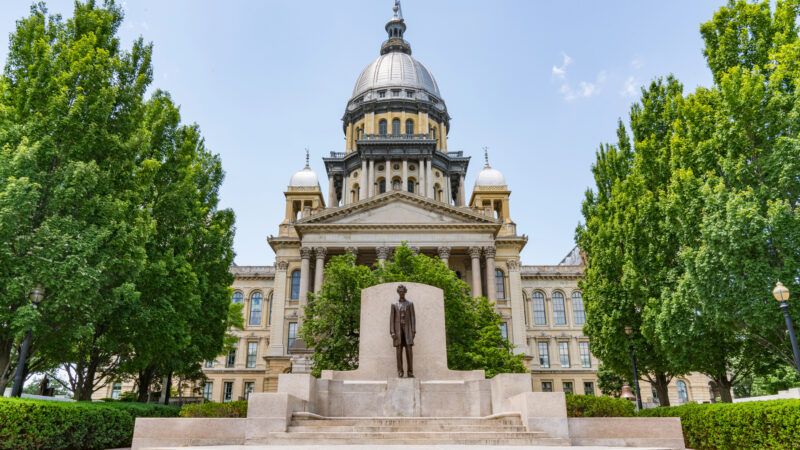Illinois Scholarship Program Explicitly Excludes White Applicants
The Minority Teachers for Illinois Scholarship Program is blatantly unconstitutional.

The Minority Teachers for Illinois Scholarship Program violates the 14th Amendment, alleges the Pacific Legal Foundation (PLF) in its Tuesday complaint on behalf of the American Alliance for Equal Rights in the United States District Court for the Central District of Illinois. The racial criteria included in the program have been "excluding students from a state-funded scholarship program because of their race" since its inception, per PLF's press release.
The Minority Teachers for Illinois Scholarship Program is not a private initiative; it is funded directly by appropriations from the state budget. The program received $1.9 million, $4.2 million, and $7 million from Illinois taxpayers in fiscal years 2022, 2023, and 2024, respectively. Illinois Fiscal Year 2025 Budget Highlights reports that the program is set to receive $8 million.
Illinois' teacher demographics do not reflect those of its students: 6.2 percent of Illinois teachers were black and 8.4 percent were Hispanic while 16.5 percent of Illinois students were black and 27.5 percent were Hispanic in 2023. The scholarship program was established by a 1992 Illinois state law to address this disparity.
The program was established to encourage "academically talented Illinois minority students to pursue teaching careers…and alleviate the teacher shortage crisis in this State." To this end, the program offers scholarships to defray the costs of qualifying higher education up to an annual maximum of $7,500 in exchange for one year of teaching in Illinois K-12 schools per year of funding received.
Illinois' teacher shortage persists: 4,096 teaching positions went unfilled and 3,694 were filled by "hiring substitutes, hiring retired educators, combining classes, and increasing class sizes," according to the 2023–2024 Educator Shortage Survey published by the Illinois Association of Regional Superintendents of Schools.
The Illinois statute governing the scholarship programs defines an eligible applicant as "a minority student who has graduated from high school…and has maintained a cumulative grade point average of no less than 2.5 on a 4.0 scale." The definition of minority student comprises five racial groups: American Indian or Alaska Native, Asian, Black or African American, Hispanic or Latino, and Native Hawaiian or Other Pacific Islander.
White applicants are explicitly ineligible for the public scholarship program. The American Alliance for Equal Rights brings the suit on behalf of one such candidate who, "except for her race…is qualified, ready, willing, and able to apply to the Scholarship Program," per the PLF complaint. By barring "otherwise eligible applicants from applying for…a Minority Teachers of Illinois Scholarship on the basis of their race," PLF attorneys Samantha Romero and Erin Wilcox argue that the program violates the 14th Amendment.
As if one violation of the Equal Protection Clause weren't enough, other racial classifications abound. The statute states that "at least 35% of the fund appropriated for scholarships…shall be reserved for qualified male minority applicants, with priority being given to qualified Black male applicants beginning with fiscal year 2023." The scholarship program discriminates not only against white applicants, but women and non-black minorities as well.
Further provisions extend the program's policy racial discrimination from the application process into the schools at which scholarship recipients may teach. Scholarship recipients must fulfill their teaching obligation "at a nonprofit Illinois public, private, or parochial preschool, elementary school, or secondary school at which no less than 30% of the enrolled students are minority students," as specified earlier in the statute.
Finally, the law dedicates "up to 3% of amount appropriated for the program for each of next 3 fiscal years…to increasing awareness of the program and for the recruitment of Black male applicants," if the scholarship program does not expend at least 90 percent of its budget for three consecutive fiscal years. From recruitment and application to funding and teaching, Illinois' scholarship program classifies and discriminates on the basis of arbitrary characteristics.
"Illinois basically put up a sign that said that 'teachers are wanted, but disfavored races need not apply,'" says Romero in an interview. While there is a circuit split as to whether discriminatory intent suffices to trigger strict scrutiny in the absence of disparate aggregate impact, there is no debate that de jure discrimination as practiced by Minority Teachers for Illinois Scholarship Program is unconstitutional.


Show Comments (31)